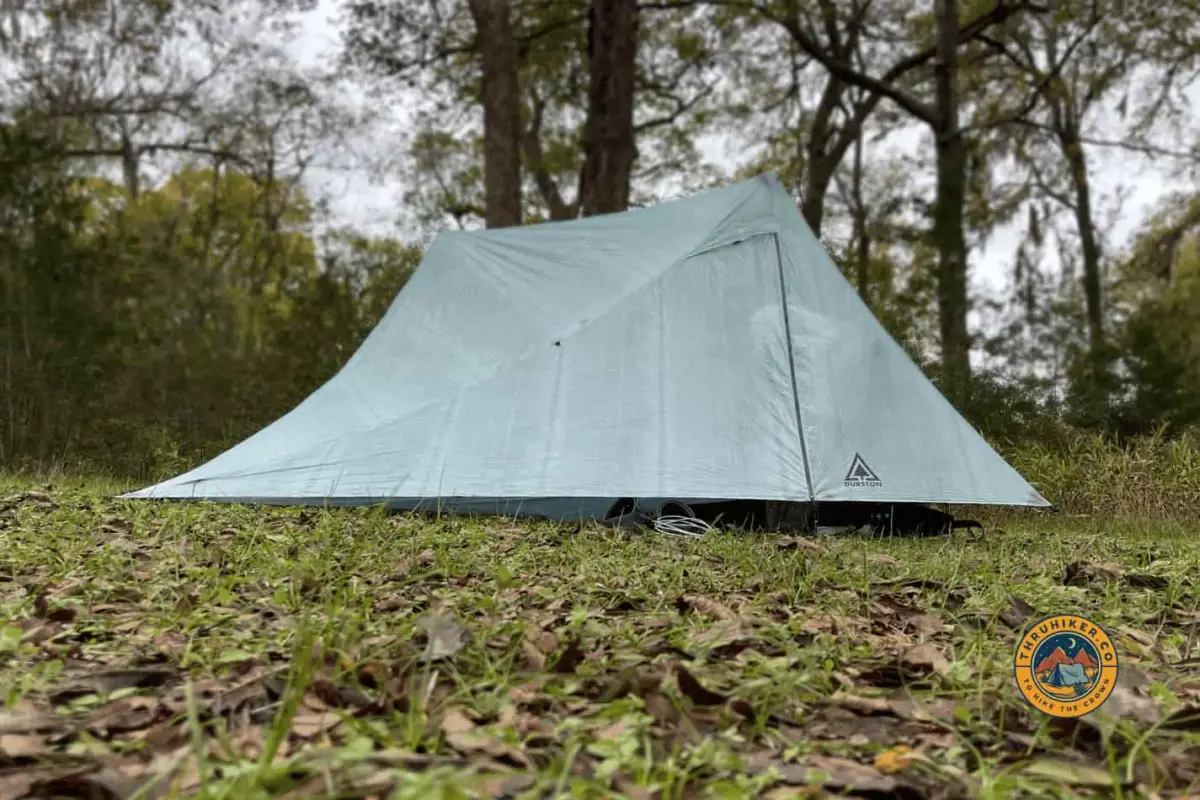When you are beginning to look into thru-hiking, most people start to imagine what shelter they should choose.
One part of choosing a tent is the cost, but balancing the cost with getting a good return on the choice is equally important. The key here is how long your tent should last.
For most thru-hikers, you want your tent to last through your hike. While this may seem simple, a thru-hike puts tremendous pressure on your tent as it endures constant degradation from the elements, consistent use, the ground and sun conditions, and much more.
All these things cause the tent to fail, from failing zippers to broken poles or other defects. Let’s dig more into how long a good tent should last.
A tent’s lifespan depends on the material’s quality and how well it is maintained paired with total use; this is why thru-hiking can be hard on a tent.
The Best Case Scenario: Tent Lifespans With Normal Use
While the expected lifespan for many tents can be expected for 10-20 years with good treatment, this is with sparing use.
Most standard campers’ tents will be used for 10-15 days a year. Caring for, cleaning, maintaining, and storing your tent can last almost forever.
The real issues with lifespan come from the lifestyle of a thru-hiker. The time on the trail adds to the lack of time for TLC.
The Tent Killer: How Thru-Hiking Destroys Lifespans
Due to the consistent activity of a thru-hiker, the lifespan of a tent can be much shorter than that of a standard tent use.
Thru-hiking requires months and many miles of continuous use on the trail. These conditions cause the tent to experience consistent wear and tear, which shortens how long it will last.
Most tents can withstand at least 1,000 miles, and all the conditions that come with them, but each triple crown trail comes in at 2000+ miles.
After this amount of time, most tents start to show issues. But quality materials and maintenance may extend the life of your beloved shelter even further.
The Culprits: Elements and Actions That Ruin Your Shelter
Many things lead to gear failure over a thru-hike. Your tent is exposed to many cases of abuse over four to six months out on the trail that we can discuss:
Frequency Of Use
Your tent is your home on a long-distance hike when most tents can last 20 years with 10-15 uses a year, which amounts to only 200-300 uses throughout its life, with cleanup after each use.
A six-month thru-hike will equal nearly 200 nights on the trail.
This means you would put almost 20 years of comparable use onto your tent in just a single thru-hike!
Material Construction Of Tent
Many materials are used to make tents, some of which will last far longer than others, so even though they cost more, thru-hikers are willing to pay for durability and reliability.
Many will go the more long-lasting but expensive tent route by purchasing a Dyneema Composite Fabrics (DCF) shelter, like the Zpacks Duplex, over less expensive Sil-Nylon.
Exposure To The Elements
The next problem for thru-hikers tents is the exposure issues that happen daily.
The sun, rain, snow, wind, and even sand can all lead to wear and tear on a tent. Sunlight (UV) held for extended periods can break down nylon tent fabrics.
These conditions are abundant on the trail and must be considered when deciding how long a tent should last for a thru-hiker.
Sun and UV
UV light deteriorates nylon fabrics, so most tents have a light-colored UV coating. So you want to ensure you minimize all-day use in the sun as much as possible.
Ground Conditions
The ground you use your tent on can also determine how long a tent will last, as some surfaces can naturally wear away fabric faster.
Rocks and roots are two of the main culprits, with their sharp corners eating away at even the most robust fabrics.
Wind
The wind is another element to consider, with howling strong winds on some of the higher elevations leading to the possibility of shredding a shelter if you don’t stake it out well enough.
Snow or Rain
Rain is in never-ending supply for many hikers; the same goes for snow in some places. Snow is heavy and can lead to weird stress being placed on a shelter and its poles, leading to gear failure.
Then you also have to take care to properly dry out your tent as there will be many days where you have to pack up while still wet, which can lead to mildew and mold if you don’t get it dry quickly enough.
Special Features
Then there are the bells and whistles, the “special” things that may have been sales points but are problems waiting to occur.
Clips
Any plastic clips and zippers that save weight and/or cost should be regularly checked. These break more often than you think and are very difficult to replace.
Cheap Poles
Tent poles can break under stress, and cheap tent poles from subpar materials will fail more frequently.
Proper Maintenance
Quality maintenance on your tent will extend the life of any tent you own if done correctly and regularly.
This includes cleaning your tent when you reach a town or have downtime, checking for holes and tears, spot-cleaning any stubborn dirt or mud, and making sure the poles are still in good shape.
Performing Quality Repairs
Taking the time to fix minor problems before they become major concerns is the best way to ensure your tent’s longevity.
Keeping Your Home Alive: Maintenance That Extends Tent Life
To lengthen the life of your tent, here are a few maintenance tasks you should perform regularly:
Clean and maintain your tent
While on the trail, finding time to do maintenance and cleaning is essential in keeping your tent in good working order.
Check for tears and holes
Check all material for wear and tear, and look for loose stitching or fabric fraying. If you find any damage, repair it immediately with a patch kit or seam sealer.
Treat your tent with care
Try to baby your tent as much as possible. Take extra care when packing and unpacking your tent, and avoid dragging it across rough surfaces.
Choose a nice campsite
Look for a spot with no roots or rocks, which can be exceptionally rough on your tent’s fabric.
It would be best if you chose to add a footprint to provide extra protection to the bathtub or floor of your tent.
Never store your tent wet
While you may pack away your tent in the morning wet, you need to stop as soon as the sun is out shining and then grab out your tent and get some total exposure.
This helps to dry out the tent but also helps to manage mildew and mold as the sun’s UV rays help break down the bacteria and make it easier for your tent to breathe.
Treat your poles well
Inspect the tent poles periodically to ensure they’re in working order. You don’t want to leave town with cracked poles that lead to failure when out away from town if you can help it.
Knowing When It’s Time To Let Go And Upgrade
You want to begin looking at a new tent when the fabric is starting to wear thin or has significant holes, or develops severe holes.
Likewise, if your tent poles are bent beyond repair or the zippers are broken and unable to be replaced, it’s probably time for an upgrade.
Budgeting For Your Next Piece of Lightweight Paradise
If you decide to replace your tent, how much should you spend? For the severe thru-hiker, this will more than likely be $300+.
This begins with the Sil-Nylon options like the Nemo Hornet Elite or DCF with the Duplex.
However, if you are focused on getting ultralight, the Zpacks Plex Solo has become a favorite, weighing under a pound in total weight.
Check here to see my list of top two person ultralight tents updated regularly.
Final Thoughts On How To Make a Tent Last
Ultimately, how long your tent lasts depends on how well it is cared for and how much you use it.
If you take good care of your tent and keep it clean, it should last a very long time no matter how often you use it!
On the other hand, if you are an avid thru-hiker or backpacker, you may want to consider how often you use your tent and how much abuse it takes on the trail.
Quality materials will always last longer, so research before making a purchase. A good tent should last several years or one thru-hike with proper care and maintenance!
There is no one correct answer to how long a tent will last; it will always depend on how you use it and how well you take care of it, but you need to know it can’t last forever.


Leave a Comment